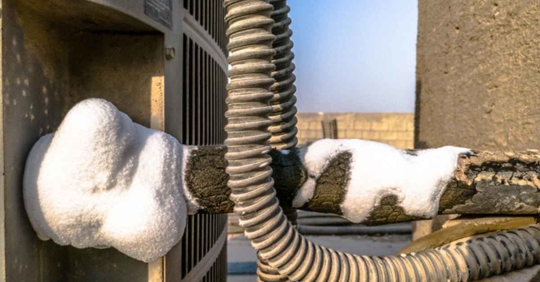When temperatures rise in the Outer Banks, your air conditioner becomes one of the most critical systems in your home or business. So when you notice ice forming on your AC unit, it’s more than just a strange sight — it’s a sign that something is wrong. Ignoring it could leave you sweaty, stressed, and facing expensive repairs.
Noticed ice on your AC? Don’t wait for things to get worse. Contact us today or call (252) 418-2914. We’re ready to help!
What Does Ice on Your AC Mean?
Seeing ice on your air conditioner, especially on a hot day, may seem like a cooling bonus, but it’s a red flag. Ice means your system isn’t operating properly, and it’s likely struggling to effectively cool your home or office.
Here’s what could be happening:
- Restricted airflow
- Low refrigerant levels
- Dirty coils
- Malfunctioning parts
Each of these issues can strain your system and lead to a complete breakdown if not addressed quickly.
Common Causes of Ice Buildup on Air Conditioners
If your AC is freezing over, one or more of the following could be the culprit:
- Dirty Air Filters: Clogged filters block airflow, causing the coils to get too cold and freeze up.
- Low Refrigerant: A refrigerant leak or low level causes pressure drops, leading to ice formation.
- Blocked or Closed Vents: Poor airflow from closed or obstructed vents can result in uneven cooling and icing.
- Dirty Evaporator Coils: Coils covered in dirt or debris can’t absorb heat properly, which can cause freezing.
- Malfunctioning Blower Fan: If the blower motor isn’t moving air efficiently, cold air stays around the coils too long.
Quick Tip: Changing your air filter every 1-3 months can help prevent some of these issues.
What Happens If You Don’t Address It?
Ignoring ice on your air conditioner is risky. What starts as a minor issue can escalate into major damage if unresolved. Ice buildup can strain vital system components like the compressor and coils, forcing your AC to work harder than it should.
Here are some of the most common consequences of ignoring the problem:
- Higher energy bills – Your system uses more power to produce less cooling.
- Reduced system lifespan – Prolonged stress on your AC can lead to premature failure.
- Poor indoor air quality – Improper cooling can allow humidity and allergens to build up.
- Complete system failure – The longer you wait, the more likely your unit may need costly repairs or full replacement.
Over time, this issue doesn’t just affect your comfort. It can cost you significantly in terms of both energy and repair bills. The sooner you act, the better your chances of avoiding a major breakdown.
What to Do If You See Ice on Your AC
Seeing ice on your air conditioner can be alarming, but there are a few steps you can take before calling a pro. These initial actions can help prevent further damage and give your system a chance to stabilize.
Here’s what you can do right away:
- Turn off your AC at the thermostat – This stops the cooling process and prevents more ice from forming.
- Switch the fan setting to “ON” – Running the fan helps melt the ice by circulating warm air across the coils.
- Check and replace your air filter – A clean filter improves airflow and reduces the chance of freezing.
- Ensure vents and registers are open and unblocked – Good airflow is key to preventing ice buildup.
- Inspect the outdoor unit – Clear away leaves, grass, or debris restricting airflow.
If ice continues to return after these steps or if the AC doesn't cool properly once the ice melts, it’s time to call a professional. Deeper issues, like refrigerant leaks or mechanical failure, could require expert diagnosis.
Important: Do not turn your system back on to cool again until a technician has inspected it. Running your AC while it’s still struggling can do severe damage.
Call in the Pros from the Outer Banks
At Delta T Heating & Air, we’ve helped homeowners and small business owners across the Outer Banks stay cool and confident, no matter how hot it gets. We’ll diagnose the cause of the icing and provide efficient, honest solutions built to last. Learn more about our AC repair services.
Not sure what’s causing the freeze-up? Schedule service now or call (252) 418-2914 before it turns into a costly fix.

